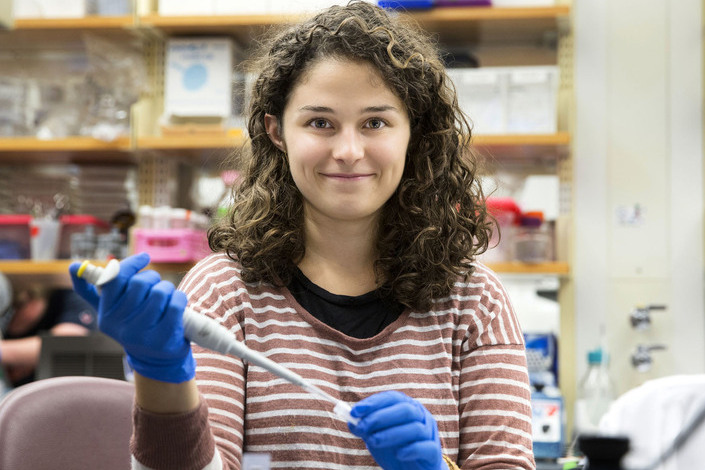In a sense, Alex Berr’s research career at the University of Virginia began before she even enrolled. As a high school student at nearby Western Albemarle High School, she spent two summers doing research in the biomedical engineering department. She worked in Associate Professor Kim Kelly’s lab, on a project that studied bacteriophage as a method of targeting pancreatic cancer.
“It was my first exposure to actually applying knowledge in a real-world research setting,” she said, “and since then I’ve stayed pretty interested in it.”
Now a rising fourth-year student majoring in biomedical engineering in the School of Engineering and Applied Science, Berr recently won a Harrison Undergraduate Research Award for a project to study genetic subtypes of brain cancer cells.
The Harrison Awards support outstanding undergraduate research projects, as selected by a Faculty Senate committee. Students receive up to $3,000 to fund their projects. Faculty advisers, who submit a letter in support of the project and serve as mentors, receive $1,000 in research support.
“My project stems from the need to create better personalized treatment for patients with glioblastoma, which is the most malignant form of brain cancer,” Berr said. “Right now there’s just one standardized method of care for patients, and it means that patient-specific treatment isn’t really used.”
In some other cancers, such as breast cancer, researchers have been able to identify subtypes, and doctors can now test patients for their subtypes and then treat them accordingly, Berr said.
“Brain cancer doesn’t have this yet,” she said. “So for my project I’ll be looking at different glioblastoma subtypes, seeing how they’re affected by their tumor microenvironment and seeing how that microenvironment reduces or changes the way that they respond to treatment.”
The project grew out of Berr’s work with Professor Jennifer Munson, her faculty adviser. Munson’s lab uses tissue engineering to make patient-specific tissue culture models of cancer.
“Basically we try to recreate [a patient’s cancer] in a dish, so we can hopefully test therapies or discover new potential therapies,” Munson said.
Berr’s project will work in parallel with those of graduate students in the lab, who are looking at elements of the tumor microenvironment.
Berr, who chose U.Va. in part because she wanted to be involved in cutting-edge research, was one of the first students to join Munson’s lab when it started up last January.
“She’s incredibly creative and proactive, and she’s been very good at handling complex experiments,” Munson said.
Post-graduation, Berr hopes to continue her research in tissue-based engineering, with the aim of earning her Ph.D. and eventually going into academia. Her Harrison research project seems likely to help along that path: She has already presented some of the work at the Biomedical Engineering Society’s annual meeting, and Munson said she hoped the project will lead to an independent publication with Berr as the primary author.
“I’ve worked with a lot of undergraduates throughout my career,” Munson said, “and she’s definitely the most independently motivated and excited about the research questions.”
Media Contact
Article Information
August 17, 2015
/content/undergraduate-engineer-seeks-solutions-brain-cancer-treatments

